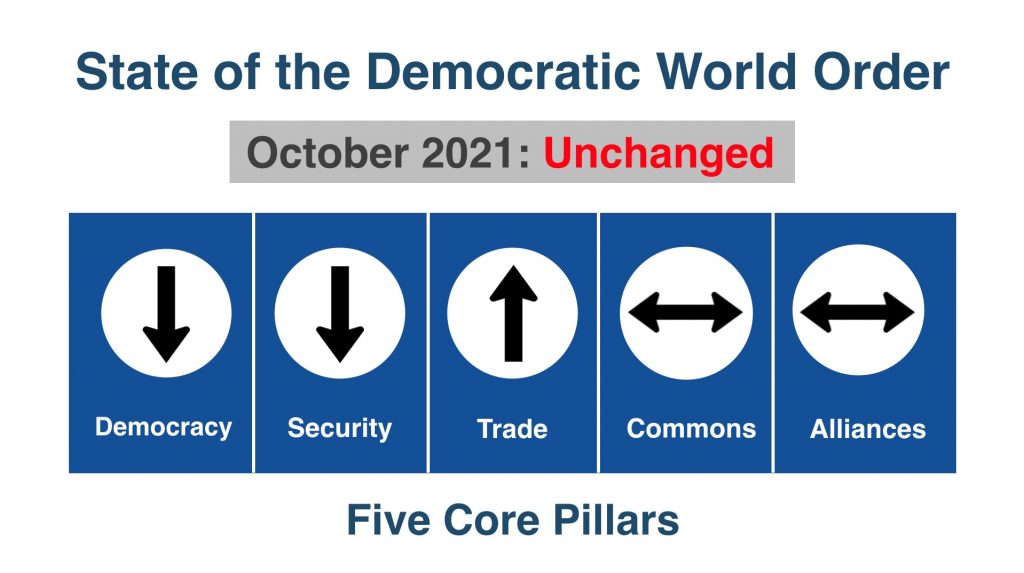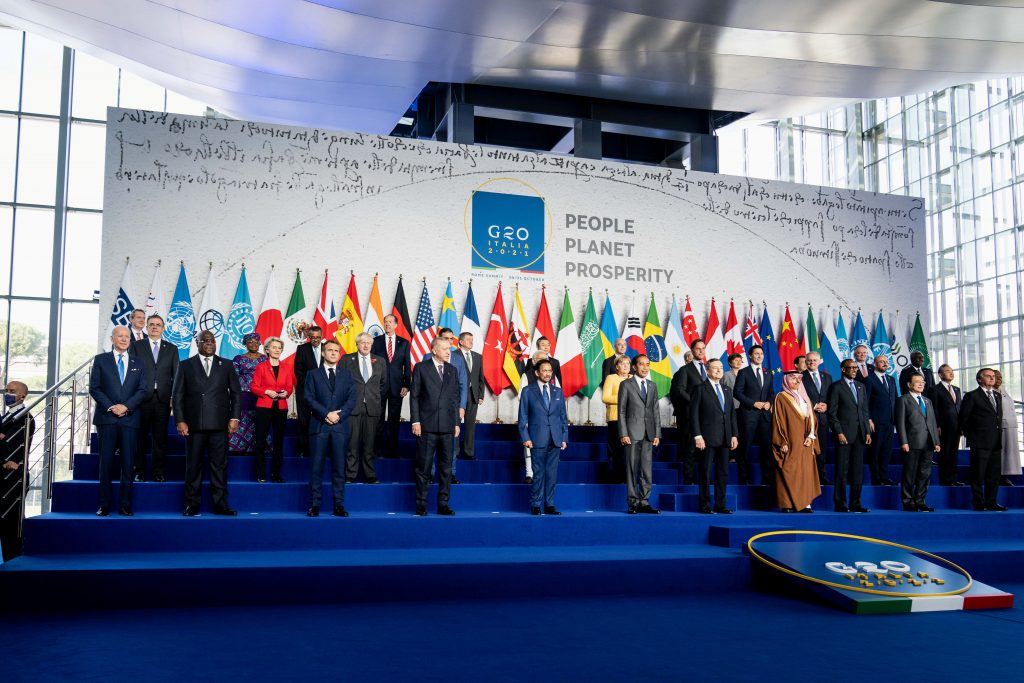Reshaping the order
This month’s topline events
Biden at the G20. On only his second overseas trip as president, Joe Biden joined the leaders of the world’s most powerful economies in Rome for the annual G20 Leaders’ Summit. While Chinese president Xi Jinping and Russian president Vladimir Putin were notably absent (joining virtually instead), the G20 endorsed a previous agreement to set a global corporate minimum tax of fifteen percent and agreed to boost the global COVID vaccine supply.
- Shaping the order. Biden’s presence at the G20 and his administration’s efforts to drive forward the global tax accord showcased American leadership on the global stage. But the absence of any significant new commitments, particularly on the climate front, highlighted the difficulty of garnering consensus on key challenges in an increasingly fractious international system.
- Hitting home. The global tax deal could discourage US companies from sheltering revenue in offshore tax havens and relocating facilities overseas, potentially preserving American jobs.
- What to do. While the G20 provides an important venue to engage with global powers, the Biden administration should continue to bolster cooperation with likeminded democracies in other venues where action is more likely to succeed.
Defending Taiwan. For the second time in two months, Biden stated the United States was committed to defending Taiwan in the event of an attack by China – a position that would depart from a long-held US policy of “strategic ambiguity” on Taiwan. A White House spokesperson later suggested the remarks did not signify a change in policy. Separately, Taiwan’s president acknowledged for the first time the presence of US troops on the island for training purposes, while Chinese Foreign Minister Wang Yi warned the US and its partners not to interfere in Taiwan’s affairs.
- Shaping the order. Biden’s pledge to defend Taiwan, despite being walked back, suggests the US may be preparing the ground for an eventual shift in policy from “strategic ambiguity” to “strategic clarity” on Taiwan – a move that Beijing will almost certainly view as provocative but one that could help deter a future Chinese attack.
- Hitting home. Deterring an attack against Taiwan would help preserve regional peace and avoid a potential military confrontation, which could have far-reaching economic impacts.
- What to do. The administration and Congress should continue to move toward a policy of strategic clarity to defend Taiwan against any potential attack, while bolstering the military capabilities of Taipei and other US allies in the region.
Assad’s Revival. After years of diplomatic isolation, Syrian president Bashar al-Assad was invited to speak with Jordan’s King Abdullah for the first time since the regime began its brutal crackdown against a popular uprising in 2011. Other Arab states, including Egypt, Bahrain, and the United Arab Emirates, moved to revive diplomatic and economic ties as Assad continues to consolidate his grip on power.
- Shaping the order. Throughout the Syrian uprising, the Assad regime has engaged in a campaign of violent oppression and committed mass atrocities against its own people, including through the use of chemical weapons, leading to the deaths of hundreds of thousands of civilians. Yet the recent flurry of diplomatic engagement with Syria suggests that if their crackdown is successful and they wait long enough, violent dictators can be re-legitimized – a serious setback to the advance of a rules-based democratic order.
- Hitting home. Assad’s revival could bolster support for Hezbollah and other terrorist groups, increasing the threat of violence against Americans and US allies in the region.
- What to do. The US should maintain its policy of isolation and sanctions against Syria until the regime is held accountable for its atrocities, and should strongly encourage US allies, including in Europe and the Arab world, to hold the line on normalizing relations with Damascus.
Quote of the month
“At this moment, the global political landscape is undergoing drastic change. Free and democratic countries around the world have been alerted to the expansion of authoritarianism, with Taiwan standing on democracy’s first line of defense. …The situation in the Indo-Pacific region is becoming more tense and complex by the day …[D]emocratic countries are working to strengthen our broad-based, mutual cooperation in order to respond to regional and global developments.”
– Taiwan President Tsai Ing-wen’s National Day speech, October 10, 2021

State of the Order this month: Unchanged
Assessing the five core pillars of the democratic world order
Democracy ( ↓ )
- As noted, Jordan’s King Abdullah spoke with Syrian president Bashar al-Assad for the first time since the Syrian uprising began, as other Arab states welcomed re-engagement with Damascus, despite the regime’s commission of mass atrocities and use of chemical warfare against civilians.
- Sudan’s military seized power, arresting the country’s prime minister and dissolving the transitional government, sparking widespread protests and undermining Sudan’s fragile transition toward democracy.
- The United States rejoined the UN Human Rights Council, three years after former President Donald Trump’s withdrawal, as the Biden administration seeks to strengthen US support for human rights.
- On balance, the democracy pillar was weakened.
Security ( ↓ )
- According to Mark Milley, chairman of the US Joint Chiefs of Staff, China has tested a hypersonic missile designed to evade America’s missile defense systems, a move that he described as very close to a “Sputnik moment.” A new Pentagon assessment also indicated that China will likely have at least 1,000 deliverable nuclear warheads by 2030, a significant expansion from the 200 warhead arsenal it possessed last year.
- US officials issued new warnings about China’s ambitions to develop artificial intelligence and other advanced technologies that could give Beijing a decisive military edge and eventual dominance over key economic sectors.
- China and Russia held joint naval drills in the Pacific Ocean, an indication of the two nations’ growing political and military alignment.
- Russia shut down its mission to NATO, after NATO expelled eight members of the Russian delegation, alleging they were working as undercover spies.
- In light of these developments, the security pillar was weakened.
Trade ( ↑ )
- The US and EU reached an agreement to suspend steel and aluminum tariffs imposed by the Trump administration and began discussions on a more sustainable pathway to resolve the issue.
- As noted, the G20 endorsed an agreement negotiated by the Organization for Economic Cooperation and Development and joined by over 130 nations that sets a minimum global corporate tax rate of fifteen percent.
- In light of these developments, the global trade pillar was strengthened.
Commons (↔)
- While pledging to end the financing of coal power plants in countries outside their own, the G20 failed to agree on firm commitments to end the use of coal or to take other significant actions to reduce global warming, as world leaders headed for a major global climate summit, known as COP26, in Scotland.
- G20 leaders pledged to vaccinate seventy percent of the world’s population against COVID by mid-2022, while the pandemic reached a grim milestone – killing more than five million people around the world.
- On balance, the global commons pillar was unchanged.
Alliances (↔)
- On the margins of the summit, Biden met with French president Emmanuel Macron in an attempt to smooth relations amid tensions over the recent AUKUS submarine deal between the US, Australia, and Britain. Biden acknowledged that the US had been “clumsy” in its approach and that France is “an extremely valued partner,” as the two leaders agreed to strengthen cooperation in the Indo-Pacific and on counterterrorism in Africa.
- Relations between France and Australia remained strained, as President Macron suggested that Australian Prime Minister Scott Morrison had lied about the submarine deal. The two leaders met in Rome to begin efforts to repair their damaged relationship.
- Overall, the alliances pillar was unchanged.
Strengthened (↑)________Unchanged (↔)________Weakened (↓)
What is the democratic world order? Also known as the liberal order, the rules-based order, or simply the free world, the democratic world order encompasses the rules, norms, alliances, and institutions created and supported by leading democracies over the past seven decades to foster security, democracy, prosperity, and a healthy planet.
This month’s top reads
Three must-read commentaries on the democratic order
- Former US Secretary of State Madeleine Albright, writing in Foreign Affairs, argues that it would be a grave error for the United States to waver in its commitment to democracy, which she suggests is poised for a comeback.
- Taiwanese President Tsai Ing-wen writes in Foreign Affairs that if Taiwan were to fall, the consequences for the democratic alliance system would be catastrophic, as it would signal that in today’s global contest of values, authoritarianism has the upper hand over democracy.
- Eliot Cohen, in The Atlantic, contends that if America succumbs to its internal divisions and its desire to withdraw from international politics, the world order, such as it is, will crumble.
Action and analysis by the Atlantic Council
Our experts weigh in on this month’s events
- Matthew Kroenig, in a new Forward Defense report, outlines a strategy for the US and its allies to deter Chinese strategic attack as China continues its strategic forces buildup that could threaten the US-led, rules-based international order.
- Fred Kempe, in CNBC, argues the US-China bilateral relationship is increasingly significant – and potentially perilous – as both countries struggle to manage brewing tensions amid their domestic challenges and competing visions of global leadership.
- Matthew Kroenig and Jeffrey Cimmino, in The Dispatch, argue that the US and its allies should work closely to deter a Chinese attack on democratic Taiwan to avoid full-scale war.
- Dan Fried and Brian O’Toole, in the New Atlanticist, offer steps to improve the US Treasury Department’s latest sanctions policy review by implementing more discrete, achievable goals and clarifying guidance across sanctions programs.
__________________________________________________
The Democratic Order Initiative is an Atlantic Council initiative aimed at reenergizing American global leadership and strengthening cooperation among the world’s democracies in support of a rules-based democratic order. Sign on to the Council’s Declaration of Principles for Freedom, Prosperity, and Peace by clicking here.
Ash Jain – Director for Democratic Order
Dan Fried – Distinguished Fellow
Jeffrey Cimmino – Assistant Director
Danielle Miller – Project Assistant
Paul Cormarie – Georgetown Student Researcher
If you would like to be added to our email list for future publications and events, or to learn more about the Democratic Order Initiative, please email AJain@atlanticcouncil.org.
Image: U.S. President Joe Biden and other leaders stand for a family photo at the G20 summit at the La Nuvola in Rome, Italy October 30, 2021. Erin Schaff/Pool via REUTERS
